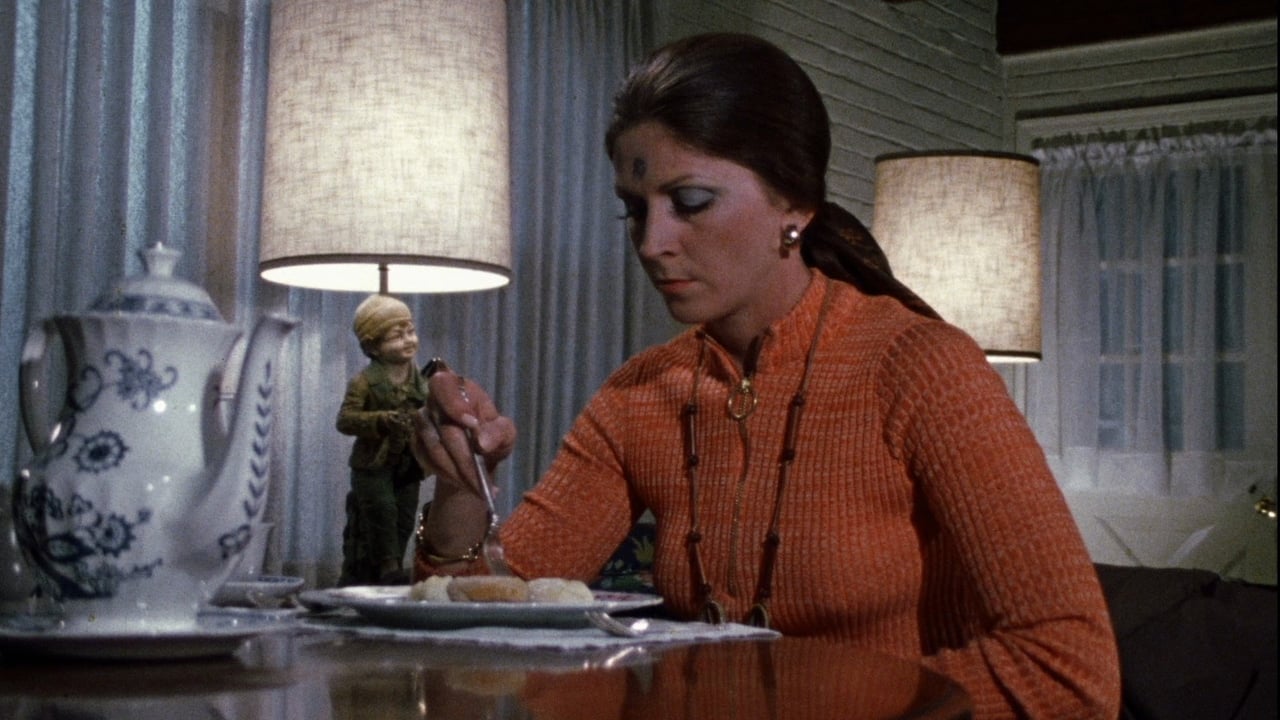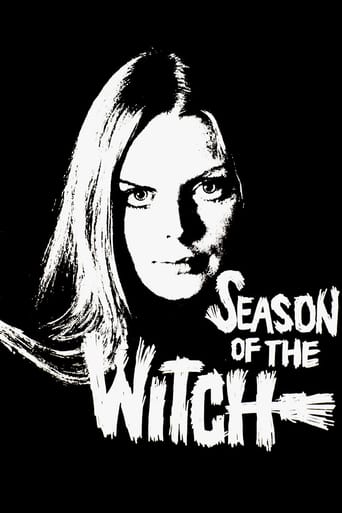Steinesongo
Too many fans seem to be blown away
GamerTab
That was an excellent one.
StunnaKrypto
Self-important, over-dramatic, uninspired.
Livestonth
I am only giving this movie a 1 for the great cast, though I can't imagine what any of them were thinking. This movie was horrible
Rainey Dawn
"Hungry Wives" aka "Season of the Witch". OK there are movies that work better when they are fast-paced, some that work better at a mid-pace, and other films are better at a slow-pace. This film is not slow-paced it's slower than a snail's pace - it's at a dragging-pace, painfully slow.A housewife is bored. She has a husband that is not home most of the time and when he is home it's a stale relationship. She has a daughter that has her own life and really doesn't care about her. She has gossipy friends that are rather a bore as well. So she's alone most all the time and utterly bored so she decides to try witchcraft as a solution - to spice up her life I guess. Well, we finally get about 10 minutes of her witchcraft which doesn't amount to a hill of beans - a love spell of all things - this leads us to adultery which she seems to like more than her new found hobby witchcraft. At the end, she grows tired of her lover. Oh and she starts telling others "I'm a witch".I think the witchcraft is suppose to be a metaphor for real life women's lib movement that was still going on at the time of this film - but was shown as literal witchcraft in this film.There was some stink about the releasing of this film - and was marketed as soft-core porn much to the displeasure of Romero -- so I read somewhere. Makes no sense to me after watching this film... it would barely qualify as soft-core porn if it does at all. And the cut footage was cut to qualify it as soft-core porn in the 70s - do what?! Seems that is what they cut was soft-core porn bits but whatever. I just know there is cut footage that was later found and pieced back to create another release of this film. The film is boring and talky not close to soft-core porn that I can tell.2/10
InjunNose
George Romero is a very talented filmmaker and I wanted to take something away from this movie. I really did. I even rented it twice more after my initial viewing, hoping I'd see something that I missed the first time. No, I wasn't anticipating a straight horror film; I was ready to accept "Hungry Wives" on its own terms. But I could never figure out what this film was about--and neither could Romero, unfortunately. After the enormous success of "Night of the Living Dead" he wanted to avoid being stereotyped as a horror director, but both of his post-"Night" attempts to branch out ("There's Always Vanilla" and this film) were unqualified duds, and Romero returned to the horror genre shortly thereafter with "The Crazies". While it's obvious from the cinematography and the menacing atmosphere of certain scenes that a genuine talent was at work here, the end result was a royal mess. "Hungry Wives" is confusing, badly dated, and full of surrealistically unsympathetic characters (though Jan White had some charisma as 'Joan'). Sorry, George :(
Scarecrow-88
Very unusual Romero feature, which to me resembles a Cassavetes film, regarding an emotionally numb housewife, Joanie(Jan White)who desires something more than sitting at home while her hippie daughter Nikki(Joedda McClain)is out having a good time and husband, Jack(Bill Thunhurst)is always away on business. When Jack is home, he's constantly griping about this and that, and her daughter is dating Gregg(Raymond Laine), a young man who embraces a care-free lifestyle and carries a very unappealing disregard for the suburban rich and the old establishment. Joanie's sexual life is anything but grand and she finds herself drawn to Gregg, despite finding his manners off-putting, and is quite uncomfortable with his liberated, unconcerned behavior towards those he finds *ugly*. Yet, she desires for his touch after arriving home after an unfortunate night with a really troubled neighborhood gal-pal, who Gregg embarrassed earlier in the evening after a visit with a witch(..he tricked her into believing that she was smoking marijuana), hearing the passions of her daughter being *balled* by him in Nikki's bedroom. Joanie becomes intrigued with witchcraft after her initial visit with the neighborhood witch, and soon starts dabbling with it after purchasing some items from a store. When Nikki leaves home after realizing her mom was listening to her throes of sexual bliss, Joanie soon supposedly uses a spell on Gregg to seduce him, with an affair as a result. Joanie is also plagued with surreal dreams of a nightmare man(Bill Hinzman)breaking into her home, dressed in black with a creepy disfigured mask, chasing after her..when she attempts to escape Joanie finds that the outer door knobs are either chained or belted. In the opening scene, Joanie has a dream depicting various images of things both from her past(..a baby that may've been miscarried, limbs whipping across her face as hubby remains with his face buried in his newspaper unconcerned with her well being and practically ignoring her mere presence, future lover Gregg, among other things like riding a swing)and possible future, with Romero setting up the fact that this woman is troubled with a variety of emotional problems.I think the film is an experimental, avant-garde way of viewing the psychological torment of a woman needing emotional fulfillment and not finding it. Through the subtle, under-played performance of Jan White(..I love an actress who tells us through her eyes what the character is truly going through, even if we can not see it on her face), we get an idea of how Joanie is hiding buried desires while attempting to disregard how she truly feels, eventually succumbing to them. I never felt she was a witch who could perform any act of magic, but someone embracing something new and different as a way of bringing meaning to an unrewarding life. Joanie is often shown, when her husband is home(..which isn't much), miserably withdrawn and perhaps seething with regret(..this was what I felt looking at her in the scenes when they are together in bed or at the dinner table)at ever marrying this man. I don't think many casual horror(..and Romero)fans will cling to "Season of the Witch" for it really isn't a horror film at all despite the deceptive title. More of a bleak study of a woman with too much time on her hands, living an unsatisfied life yearning for something more substantial. My favorite sequences concern Bill Hinzman's masked intruder who rushes Joanie attempting to assault her in her nightmares. Romero uses a lot of expressionistic lighting, often through window shades at night with his camera often closing tightly towards the faces of characters, mainly Joanie and Hinzman's nightmare man. The opening dream sequence is something straight out of Bunuel..all you'd need is a goat as a finishing touch. Most of the film, though, is dialogue and performance, as the film often scathingly involves the nature of bored housewives, their behavior and gossip. The film very much rides on the success of White's performance because Romero's camera often focuses completely on her face. A great deal of the film is often claustrophobic, taking place in Joanie's home and Romero pretty much captures every aspect inside..this is indeed Joanie's *prison* and I felt he does a good job of often confining us to this place. Still, the film is unpolished, often moving at a rather leisurely pace, with abrupt music disrupted by quick cuts from one scene to the next. The print, for which Anchor Bay apologized for, isn't the greatest in the world, looking quite affected by time.
jonathan-577
This thin and sometimes uncertain movie is never a mess, not even when it seems improvised: the 'arty' cutting is too assured. This is a surprise even though we are dealing with Romero after all who knows what he's doing. But we are only used to him applying his talents to horror, and that's not what 'Season of the Witch' is - it's Diary of a Mad Housewife with exploitation frills and an upstart feel that definitely ain't radical chic. Romero shows a lot of compassion for this landlocked suburban housewife, and explicitly distances himself from her hipster love interest's contempt. But after this weird Cassavettes thing in the first act, everything gets verrry metaphorical - the secondary characters are metaphors for housewife's emotions, housewife is metaphor for social repression - and this works better in horror than it does in drama. Leaving us with a very weird, arty, failed yet accomplished experiment by a guy who loves his medium, kind of a pre-Martin notepad sketch.

